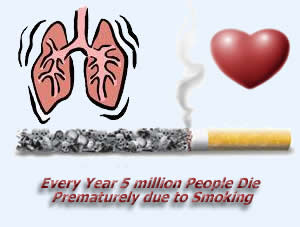Tobacco Fumes-The Addictive Smoking Saga - And The Contagious Quitting
 |
| The Mass Killer |
Smoking - that bloody small puff... sucks all the happiness and health from lives.Now a days every where we find 'No Smoking' boards (and ofcourse
people just smoke below it) , Warnings of fine for public smoking, and moreover in India smoking is banned in movies(ya.. heros can't smoke in movies
). But all said and done , still the tobacco fumes keep on consuming millions world wide. I just tried to collect some smoking statistics. Ofcourse I
am not here to preach to stop smoking. 
A brief summary of a Harvard research which says that "Smoking is addictive but quitting is contagious" is also sprinkled on here. The research says if you quit smoking( I mean quitting permanently) you will be making an unconscious punch on your friend's(and their friend's) brains literally forcing them to quit. So basically your decision can make others life more healthy ......
The Killer Fumes which Enthrall the Smoker
This stuff is very much known to all of us.We all know the lethality of killer fumes, but going through it once again may help someone, who is unable to find a reason to quit smoking.
Tobacco use leads most commonly to diseases affecting the heart and lungs, with smoking being a major risk factor for heart attacks, strokes, chronic obstructive pulmonary disease (COPD), emphysema, and cancer (particularly lung cancer, cancers of the larynx and mouth, and pancreatic cancer). The World Health Organization estimate that tobacco caused 5.4 million deaths in 2004 and 100 million deaths over the course of the 20th century. Similarly, the United States Centers for Disease Control and Prevention describes tobacco use as "the single most important preventable risk to human health in developed countries and an important cause of premature death worldwide." Rates of smoking have leveled off or declined in the developed world. Smoking rates in the United States have dropped by half from 1965 to 2006 falling from 42% to 20.8% in adults. In the developing world, tobacco consumption is rising by 3.4% per year.
As of 2000, smoking is practiced by some 1.22 billion people. Men are more likely to smoke than women, however the gender gap declines with younger age.The poor are more likely to smoke than the wealthy, and people of developing countries than those of developed countries.
Many smokers begin during adolescence or early adulthood. Usually during the early stages, smoking provides pleasurable sensations, serving as a source of positive reinforcement. After an individual has smoked for many years, the avoidance of withdrawal symptoms and negative reinforcement become the key motivations to continue.The active substances in tobacco trigger chemical reactions in nerve endings which heightens heart rate, memory, alertness, and reaction time. Dopamine and later endorphins are released, which are often associated with pleasure. Thats the reason may be it is addictive.
Smoking is addictive but quitting is contagious
 |
| Human is a Social Being and habits of quitting smoking or taking up smoking is contagious |
Over the last 30 years, the number of smokers in the U.S. has steadily decreased—a tribute to the efforts of public-health workers everywhere. And while this fact is unarguable, less obvious are the social and cultural forces that lead an individual to kick the habit. In fact, when someone crumbles that last empty pack of their favorite unfiltered brand and vows to never buy another, he might not realize that he is less like the heroic individual grasping his own boot straps and more like a single bird whose sudden left turn is just one speck in the larger flock.
These are the findings of a massive longitudinal study spanning 32 years: people quit smoking in droves. Through reconstructing the social network of 12,067 individuals, researchers from Harvard Medical School and the University of California, San Diego have discovered that smoking cessation occurs in network clusters and is hardly the isolated decision it might feel like to the individual quitter.
The first and most striking finding was the discovery that, from the larger network perspective, people quit smoking as groups and not as individuals.
A small illustration- let us say a small network containing three individual smokers, persons A, B, and C. The first person, A, is friends with B, and B is friends with C, but A and C do not know each other. If C quits smoking, A’s chances of not smoking spike 30 percent, regardless of whether or not B smokes. The middle individual, it would appear, might act as a kind of “carrier” for a social norm.
Education also seems to matter. We are more influenced by the quitting behavior of others if those people are highly educated. To add a further twist, we are also more influenced by others if we ourselves are more educated.
The research discovered that smokers are increasingly marginalized throughout social networks.This marginalization of smokers appears to occur across all educational and economic demographics.
The culture of individualism is so strong that we sometimes forget how powerfully and silently social networks and those around us influence our health. If decisions to quit cascade through social networks, then this study has provided public health campaigns a powerful new methodology with which to influence behaviors.
So buddy, if you are not bothered about your health and wish to continue smoking, may be you can think of quitting it for your friends and family (
because your quitting will make them to quit  )
)
The Indian Smoking Scenario
 |
| Hand Rolled Beedis are more common in India which are more lethal |
A recent study in India Says - "A substantial proportion of population in India has current or past smoking habit with higher prevalence among males than females. The quit-rates have been low in spite of the various anti-tobacco measures."
Tobacco smoking in India kills 900,000 people a year, a figure that is expected to rise to one million by 2010. According to a 1996 survey reported by AP news agency, 112 million people smoke tobacco in India, while some 96 million use tobacco products like chewing tobacco. India's health ministry says hundreds of thousands of people who have never smoked die each year by inhaling smoke from other people's cigarettes and bidis (small hand-rolled cigarettes common in India).
Campaigns for curbs on tobacco have always encountered arguments that tobacco makes a significant contribution to the economy through revenue and jobs.India’s tobacco industry accounts for only about 1 per cent of industrial gross domestic product (GDP), according to a new analysis which suggests that tobacco’s assumed value to the economy is a myth. The analysis by two economists has shown that tobacco’s share of industrial GDP and contribution to India’s foreign exchange reserves is insignificant, questioning views that stifling tobacco could hurt the economy.In the 1990s, the Indian Council of Medical Research had generated data to show that the health costs of tobacco-related illnesses far exceed what the tobacco industry may contribute to the economy. But tobacco lobbyists have argued that the industry is also a big employer. The new economic analysis has acknowledged that tobacco is labour-intensive and accounts for about 5 per cent of industrial jobs in the country, but its authors also caution that much of this employment is based on exploitation.
